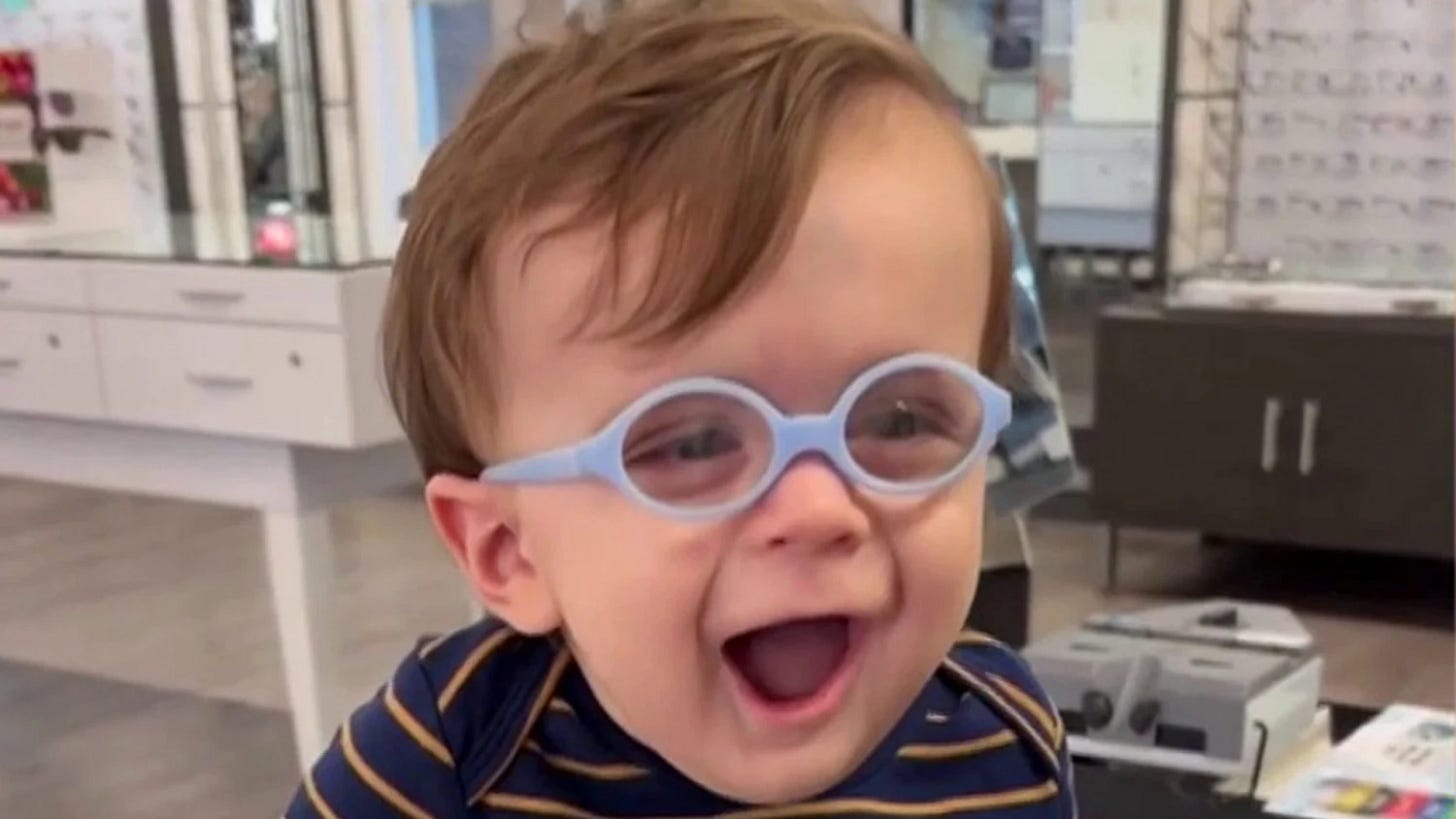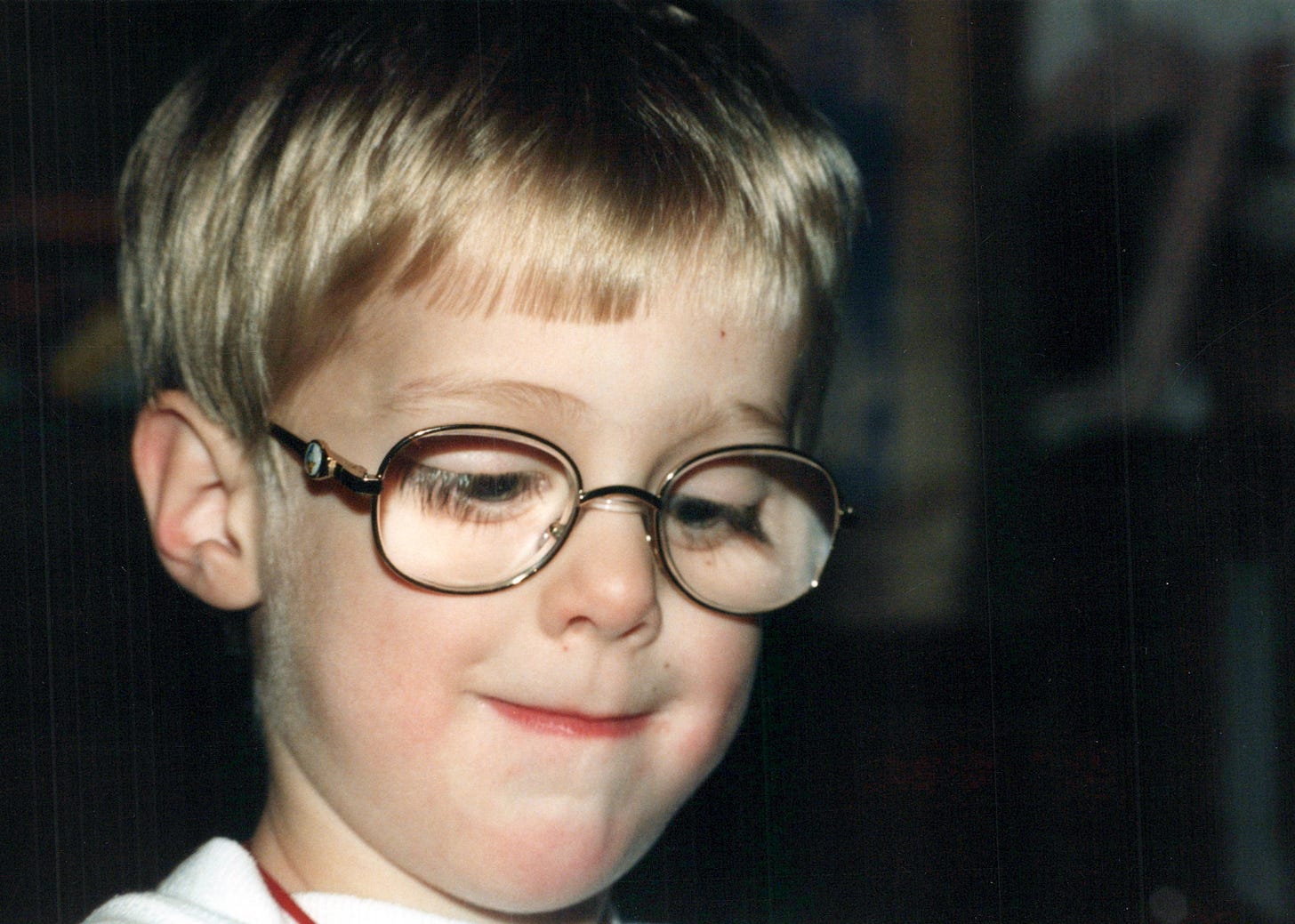What Does Meaning Mean? | Day 2 of 100
We Can Experience More Meaning by Seeing Life Differently
This is day 2 of 100 days investigating the role of meaning in the way we think about work and leadership. I'd be grateful if you subscribed to follow the journey or passed it along to someone who'd appreciate it. (See yesterday's post for the origin story of this series)
Supermarket Meaning
Has a visit to the grocery store ever changed your life?
I’m not just talking about the snacks section at Trader Joe’s or trying all the samples at Costco (twice, if you wear a hat and jacket the first time, then ditch them for round two).
I mean, have you ever had an experience in a regular ol’ supermarket that woke you up?
The other day I'm chatting with a buddy and he says, "Dude—I just had this magical trip to the grocery store." He pauses, and I can see him relive the moment quietly before he takes a breath and begins to tell me about a visit to a place he’s been 1,000 times.
On this particular grocery run, he tells me he’s coming out of the produce section and he sees a grandmother accompanied by her daughter and granddaughter. They stop at the cheese station, each of them picking up a different block. They begin bantering about the cheese and advocating for which is better, making each other laugh. My friend says he hides behind the sweet potatoes to witness all of this unfold.
"As I’m watching them I think to myself, I'm looking at what will end up being like 150 years of life spanning two centuries—two millenniums, even—between these three women. I notice they share a similar smile that rests right above their cheekbones. It made me think about time passing, and family. And how the grandmother, after she passes away, will live on in the smile of her granddaughter. Right on those cheekbones. I got kind of choked up."
He told me all of this happened in the same grocery store he always goes to. But this particular visit was somehow deeper and more meaningful.
He might've said normal trips to the grocery store are experienced in black and white.
But this one—this trip was in color.
Like my friend woke up to something new.
Seeing for the First Time (Or: Waking Up)
Have you seen these adorable videos of kids who get glasses for the first time?
The setup is always the same. The kid is at the optometrist. They’re squirmy, maybe a little irritable, and don’t really know what's going on. But the moment glasses are affixed to their little face, they beam with delight because, now they can see.
Try not to get choked up, I dare you.
I was one of those kids.
This is me:
All of a sudden, things previously unseen become seeable.
Me and all of my fellow toddlers with poor eyesight were living the same life we were living before glasses. But add glasses to the mix and suddenly we experienced our life a bit…more? A bit deeper? With a bit more clarity?
On a level we didn’t quite know existed.
Until we saw it.
It's like we woke up to something new and magical in our regular life.
You know these moments, right?
When a random grocery store visit becomes something you'll look back on as a reminder of what's important. It becomes part of your own personal framework for what matters in life.
Or when a regular conversation with a friend hits different because they see something in you that you couldn't see in yourself, and they name it and encourage you in just the right way.
Or when you're overloaded at work and a coworker jumps in to help you meet a project deadline, then walks you to the car at the end of the day and says this is just a season, it’ll pass.
Or a quiet moment at night when everyone's asleep and you let the dog out. You watch them through the window as they sniff around the backyard and eat grass like a cow under the light of the moon. You smile to yourself and give the pup extra snuggles before bed.
These are, to the naked eye, normal moments. To someone else they might mean nothing—but to you, they could define a whole season of your life.
I believe these moments are more plentiful than we realize, but we miss them because we’re looking in all the wrong places.
We’re looking when we should be seeing.
Seeing the Meaning in Our Midst
I had a poetry professor who required us to show up with 10 new poems every class. At first, it seemed like a fun challenge, but after a couple of weeks, we cried uncle.
We meet on Mondays, Wednesdays and Fridays—how can we possibly produce 30 poems a week?!
She held her ground. Thirty poems a week.
One day, all of us students organized and agreed we would write no poems for the next class. We would show up empty-handed.
As we delivered the news, she smirked. This was not her first rodeo. What she did next changed my writing practice—and my life—forever.
"Close your eyes," she said.
We all reluctantly closed our eyes.
"You know there's a window to my right, yes?" I assume we all nodded.
"And what's outside that window? A tree? Two trees?"
One student next to me whispered, "Three."
The teacher asked what kind of trees.
"Crepe myrtles. Three crepe myrtles in bloom," they said a little louder.
I remember the professor taking a deep, dramatic breath.
"Three crepe myrtles in bloom sounds like a helluva line in a poem to me—I don't know about you. What else is out this window?"
We sounded off: A cardinal. A bell tower. The horizon behind grey clouds. My future.
And with our eyes still closed, she said,
"And what do those things outside this window make you feel? What do they make you remember? What do they make you want to do? Could you write me a poem about your family and talk about your three siblings as three crepe myrtles? Could you write me a poem about where the cardinal nests at night and explore the idea of loneliness? Can you talk about the bell tower and the passage of time? Of course you can."
She then told us to open our eyes.
And she had us.
She had us in that moment I imagine every professor relishes—the moment when they're teaching us not just about their discipline, but about life.
"Poetry is about seeing," she whispered. "Stop looking for inspiration and start seeing what's right in front of you—see it more deeply than you normally do. When you do this, you don't have to write the poetry. You just record it."
We don’t have to go looking for it.
It’s right here.
One of the greatest tragedies of the human condition is our belief that things outside of us will fix us.
In some ways, all personal development comes down to realizing we don’t need anything external to make us OK. Think about it— you feel better when you don’t look to a distraction, substance or outside opinion to make it through your day—right?
That feels like health. That feels like fully engaging with your life.
Because in those moments you realize you already have everything you need to be OK.
You’re not looking outside yourself.
You wake up to the fact that you’re fully capable. You engage with your circumstances a bit differently. You see your lot in life from a different angle.
I think this is what meaning is.
Meaning is waking up to our present reality as if we were seeing it for the first time—and embracing it as if it were the last time. Meaning is accepting our circumstances not as something to be dealt with, but as something to be experienced and engaged with. Meaning is realizing we don't have to perform; we get to participate in the unfolding of this moment. Meaning is taking it all beat by beat, giddy that we get to be alive. Meaning is experiencing each mundane moment as both regular and magical at the same time. Meaning is a belief that there is something deeper going on, all the time, and a willingness to see it.
Because we know what it's like to not be able to see. We know what it's like for days, weeks, years to pass by in black and white—and we refuse to miss it anymore. We're wide awake now. Seeing it all in living color.
Does This Have Anything to Do With Work?
You tell me.
Do you want people who see in black and white interacting with your clients and customers, or do you want people who see in color leading those interactions?
Would you rather your team endure their time under your employ, or would you like them to inhabit their lives in such a way that workdays feel fulfilling, not depleting?
How long do you think we can continue feeding our employees external motivation in an attempt to keep them engaged and fulfilled before they realize they need something internal to click at a higher frequency and go looking for it somewhere else?
The answer is obvious. You want the engaged, alive, technicolor-visioned person working with you.
So here’s one final pass at a definition for meaning so we can get a step closer to making it a priority at work. We’ll start with a bunch of synonymous corporate jargon that misses the mark because it implies people need to look outside of themselves:
Purpose (you need someone to assign you a grand mission)
Mission (corporate messaging handed down from above)
Calling (waiting for some mystical revelation to strike)
Passion (discovering the "right" thing to feel excited about)
Fulfillment (an end state someone else gives you)
Success (external metrics and others' approval)
Happiness (an emotion you chase based on outside circumstances)
It’s all either circumstantial or dependent on external forces. When we chase any of the above bullets we spend energy on pursuits that never offer lasting fulfillment because we didn’t have to build a purposeful skill to get there.
Meaning, on the other hand, is a skill.
We don’t find it or discover it or happen upon it or get lucky and receive it.
We learn to make meaning.
Meaning isn't something you find—it's something you make by learning how to see life differently.
It's the practiced ability to look at an ordinary Tuesday and see it as both completely normal and quietly extraordinary. It's choosing to engage fully with whatever life puts in front of you instead of waiting for life to get more interesting.
Meaning carries us when life gets hard. It's the skill that helps us see purpose in our pain, growth in our setbacks, and connection even in our loneliest moments. When we can't change our circumstances, meaning is what allows us to see them differently.
For all the outsourcing we’re doing in our world today, we still can’t outsource our lived experience. No matter how distracted or disengaged we’ve become—for now— we’re still the ones who inhabit our existence and live out our days.
So we might as well learn how to see our ordinary lives in full color. We might as well help our teams plug in to something deeper than the task at hand.
And we might as well cry happy tears at the grocery store.






